So you’re in a financial argument with a friend or a family member, or maybe your landlord, or all of the above? You could hire an expensive mediator. Or, instead, pick up a lot of lessons about disagreeing agreeably by watching the 1976 episode of Happy Days called, "Two Angry Men." (Yes, it's the battle of the ages, when the Fonz sues Howard Cunningham.)
That is, the episode has a lot of tips about solving a financial agreement and working out any problem as long as whoever you’re arguing about money with is as reasonable as the Fonz or Mr. Cunningham.
If you’re dealing with a real hothead, then, well, maybe you should hire a mediator.
Anyway, as we tend to do here at The TV Professor, let's analyze this episode to death and see what tips we can pick up.
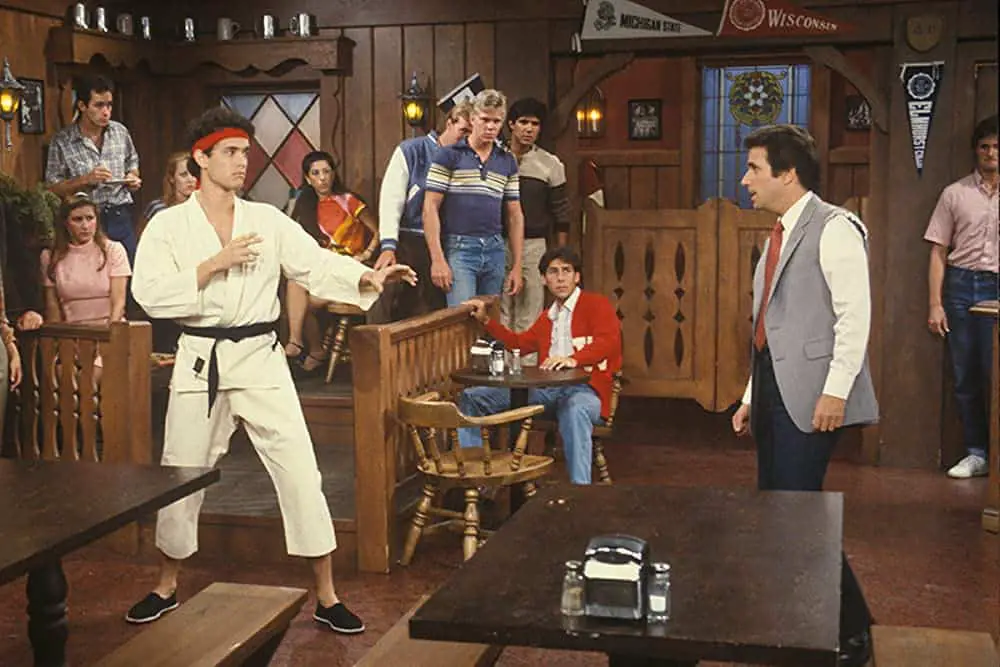
Today's "TV Lesson" Breakdown:
- But, first, a little about the "Happy Days" episode, “Two Angry Men”
- Rule #1: Determine how much money you’re fighting over
- Rule #2: When it comes to money, don’t make assumptions.
- Rule #3: Try to have a reasonable discussion about your disagreement.
- Rule #4: Try to see the other person’s point of view.
- Rule #5: Compromise
- Stray Historical Observations
But, first, a little about the "Happy Days" episode, “Two Angry Men”
In this particular episode of Happy Days, neither Mr. Cunningham nor the Fonz are exactly, well, happy.
Of course, at first, all was well in Milwaukee. The Fonz decided to raise pigeons because, well, we all remember what an avid birdwatcher he was. OK, well, maybe we don’t remember. But in this episode, the Fonz, a man of many talents, has decided that he really likes pigeons.
And as you probably do recall, the Fonz lived in a room above the Cunningham’s garage. Well, the Fonz sort of (more on this later) got permission from Mr. Cunningham to put a pigeon coop on the Cunninghams’ roof. And then that evening, after the pigeons moved into their new home, right after a heavy blizzard, the roof in Fonzie’s apartment caves in.
Mr. Cunningham wants the Fonz to pay for the damages, but the Fonz doesn’t think the roof fell apart due to the weight of the pigeon coop. He thinks the damage is due to the heft of the snow, which was resting on thirty-year old shingles. The Fonz wants Mr. Cunningham to pay for the damages.
And now, you have the ingredients for a financial disagreement.
So how do the Fonz and Mr. Cunningham work out the differences? Not very well, unfortunately. Still, there are a few rules to live by that we can come up with from watching the episode.
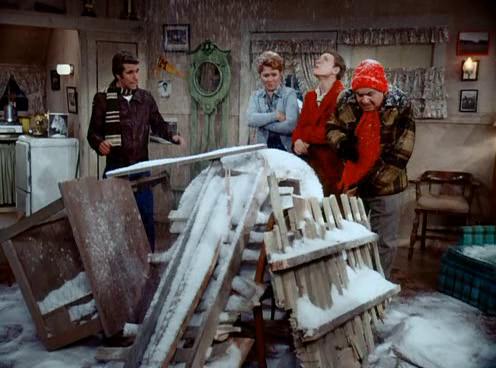
Rule #1: Determine how much money you’re fighting over
After he is alerted to the pile of snow in the Fonz’s apartment, the first thing Mr. C does is get a contractor to come up with an estimate for the damage.
The contractor is a carpenter named Marvin, a cousin of Arnold’s (Pat Morita). Arnold (as any fan of the show knows) owns the restaurant that everybody in the neighborhood frequents. Marvin determines that it’ll cost $400 to fix the roof.
But when Mr. Cunningham and the Fonz discover how much it’ll cost to fix the roof, well, that’s when those problems come about.
Rule #2: When it comes to money, don’t make assumptions.
Mr. Cunningham is a smart guy. He is the proprietor of a hardware store, and he's a full-fledged grown up. That’s why I found it surprising (or lazy scriptwriting) that he made a lousy assumption about insurance.
But, first, let's set up the scene a little. When Mr. Cunningham and Arthur Fonzarelli learn that it’ll cost $400 to fix the roof, the Fonz tells Arnold and Marvin, that Mr. C “ain’t exactly rolling in dough, you know.”
“Well, don't worry about that, Fonzie. I'm not paying for this,” Mr. Cunningham says.
“Oh. Well, then the insurance company will take care of it then, huh?” the Fonz asks.
“No, the insurance company doesn't pay for a thing like this,” Mr. Cunningham says.
And here's what I have to say -- are you kidding, Mr. C?
Of course, maybe insurance worked a little differently in the 1950s, or the 1970s when this was filmed. Still, whether it was the pigeon coop (or a “bird bungalow,” as Howard Cunningham calls it) or the ton of snow that brought the roof down, this is exactly the type of scenario when you would call an insurance company.
If, as the Fonz asserts, the roof collapsed due to the roof solely being too old, then Howard Cunningham was right. Insurance companies don’t pay to replace aging roofs.
Now, maybe Mr. Cunningham’s insurer wasn’t aware that the Cunningham household had a tenant living over the garage. Maybe Mr. C figured that the insurer wouldn’t be pleased and wouldn’t compensate him for the Fonz screwing up the roof. Mr. Cunningham would have been right about that.
Still, a good rule of thumb in any financial disagreement or uncertainty is always to never make assumptions and check your facts. Maybe Howard Cunningham’s insurance would have paid to get the roof fixed -- and a lot of courtroom drama could have been avoided.
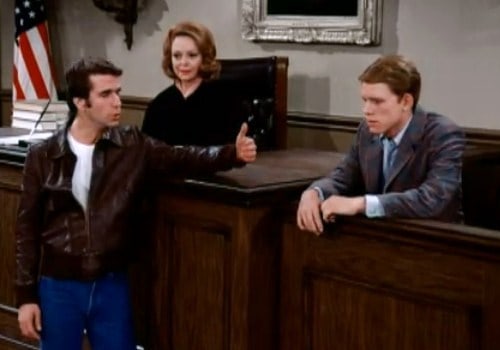
Rule #3: Try to have a reasonable discussion about your disagreement.
After the Fonz makes it clear he isn’t paying for the roof, he moves out of the Cunninghams and goes to a hotel (called The Wiscons Inn... get it? They all live in Wisconsin.). Mr. Cunningham also tells his family that he is going to sue the Fonz for $400. The Cunninghams aren’t too happy about that.
Joanie (Erin Moran) says, "I am shocked. If my own father sues a personal friend of ours who has helped me and each one of you in times of trouble, it will definitely leave an emotional scar on me for the rest of my life. And that's a long time, buster."
“You don’t want to scar your daughter, Howard,” Mrs. Cunningham (Marion Ross) says.
Mr. Cunningham, a reasonable fellow, agrees. “Well, maybe you’re right,” he says. “I’ll tell you what I’ll do. I’ll go on down and talk to Fonzie, and maybe we can straighten this whole thing out.”
Unfortunately, almost immediately, we learn that there is going to be a visit to the courthouse. It’s the Fonz, who is suing Mr. Cunningham.
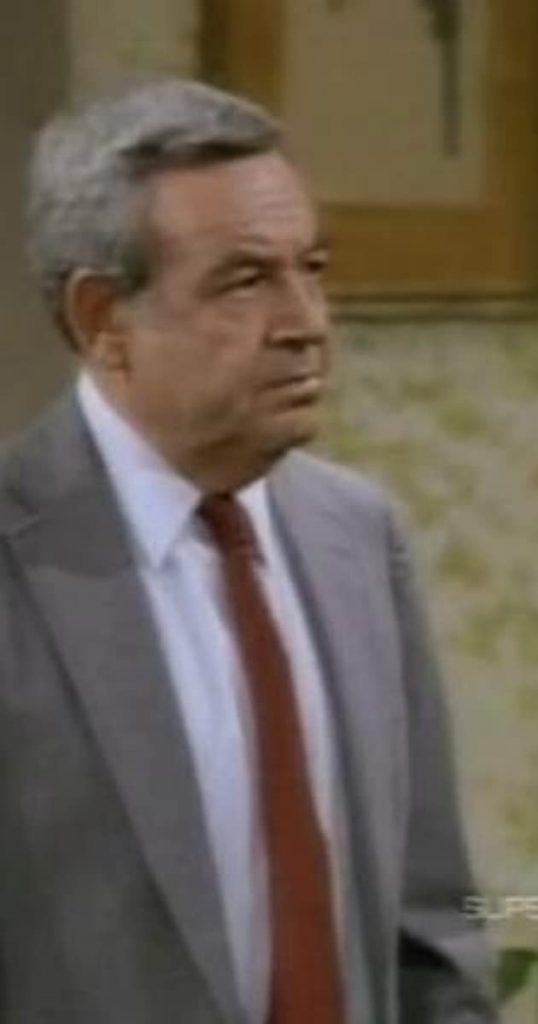
Rule #4: Try to see the other person’s point of view.
You look at a situation from the other person's point of view, and you’re almost always going to get through your disagreement in one piece. Unfortunately, when the Fonz and Howard Cunningham first face each other in court, neither of them are too accommodating to the other. In the beginning, Howard's attorney says, "Your honor, we intend to prove that the collapse of the roof was caused by the weight of a large pigeon enclosure, erected by the plaintiff without the consent of the defendant," to which the Fonz quickly snaps, "Poppycock!"
(Yes, the 1950s, as well as the 1970s when the series was filmed, was a more innocent time...)
After the trial gets underway, Howard Cunningham calls the Fonz up to the stand, and the two start talking.
“Mr. Fonzarelli, I just want to ask you one simple question,” Howard says.
“Yeah, what is it?” asks the Fonz.
“If you knew you were in the right, why didn't you tell me, right from the beginning, that you were going to build a birdhouse on the roof, instead of just asking if you could keep a few little birds?”
The Fonz asks the judge, “Do you expect me to answer a question like that?”
“Well, it would be nice,” the judge says.
And so the Fonz says, “All right, yes, I admit that I might have misled this man slightly. And I repeat, slightly.”
The Fonz still feels that he was in the right, but by looking at the situation from Mr. C's point of view... well, it's a start.
And Howard Cunningham later starts to see the Fonz’s point of view – it was an old roof, and there was a lot of snow on it – although it also takes awhile for Mr. C to come around to seeing Fonzie’s side.
Rule #5: Compromise
After a lot of back and forth in the courtroom, the judge ultimately decides in favor of Howard Cunningham: Fonzie is going to have to pay $400 to get the roof fixed.
The Fonz is aghast, and the judge says, “Oh, now, look, I know that that roof is over 30 years old, and Mr. Cunningham could have offered to help you fix it, if he was any kind of a decent human being. But you did mislead him, ever so slightly, and so I have no alternative.”
Howard’s family gives him a hard time, and after everybody leaves the courtroom, Mr. C asks if they can talk.
“How come, so you can gloat?” the Fonz asks.
Mr. Cunningham doesn’t gloat, saying, “Now, look, it is an old roof, and so I'm going to pay $200 toward it. I mean, that's the way it should have been settled in the first place. That's the way friends do things.”
The Fonz is touched. “Hey, well, let me tell you something. As a friend, you're really a gem, Mr. Cunningham.”
And once again, harmony is restored in the Cunningham household. There is also a very happy ending for Fonz. Ralph Malph, having no idea about the compromise, comes up to him and says, “Fonz, listen, all the kids are going to chip in to help you out... you know, for all the favors you've done us. Now, I don't think we can get the whole thing, but we can probably raise half.”
Howard Cunningham is almost speechless.
“Wait a minute, wait a minute,” Mr. C says to the Fonz. “I don't understand something. Well, I mean, you break my roof and then you sue me, you take me here to court, and you lose the case. I put up $200 toward it, the kids get [to pay] the rest of it? I mean, how come you don't get to pay anything?”
“How come? Cause I'm the Fonz,” the Fonz says.
Then he utters his trademark, “Ay-y-y-y.”
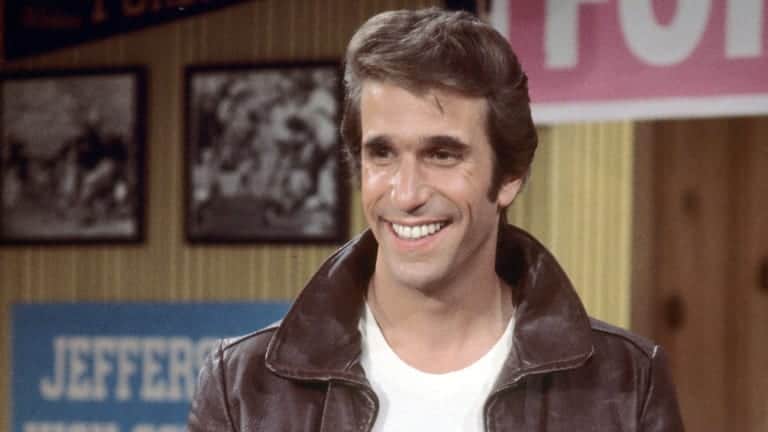
Stray Historical Observations
There is an historical phone reference in this episode. Ralph Malph mentions a phone number that he got from an attractive girl – Klondike 5. I found that a little interesting because back in the 1950s (from what I hear; before my time), you’d often ask an operator to connect you to, say, Hamilton 89341. The operator knew that the Hamilton translated into a few numbers, and suddenly you’re connected to the other person on the line.
So Ralph’s new girlfriend’s number is Klondike 5. Which is interesting because as this old Washington Post article that I'm linking to points out, Klondike translated to 55. So that’s 555. And if you watch a lot of TV and movies, you know that Hollywood productions often used the phone number 555 in their scripts because there is no phone number that begins with 555.
OK, maybe it’s not that interesting.
There is a reference to a mostly, long forgotten TV event. Richie Cunningham mentions the Kefauver Committee of 1951. Boy, talk about an obscure (to me, anyway) historical reference. But to a viewer in 1976, it was only a 25 year old reference. It would be like watching a TV show in 2022 that mentions something that happened in 1997.
In March of 1951, the Senate's Kefauver Committee hearings were televised. It wasn’t the first congressional committee to be on TV, but it caught the nation’s attention and imaginations. Approximately 30 million Americans watched the live proceedings – which were all about how organized crime was running rampant in the country.
And the Kefauver Committee really was a phenom back in the day. Schools closed or ended early to let students watch the hearings. Blood banks ran low on donations, though one blood bank in Brooklyn brought a TV into its facility, and donations shot back up. According to John Dickie's 2014 book, Blood Brotherhoods: A History of Italy's Three Mafias, housewives held afternoon "Kefauver parties." Bars were often empty; people were watching the hearings at home on TV. Sales of home-popping popcorn doubled. And, clearly, the Cunninghams were among the American families who were riveted to their television sets, watching mob bosses being questioned by Congress.
In-joke with the title of the episode. The title of this Happy Days episode, “Two Angry Men” is a nod to 1957 courthouse drama movie 12 Angry Men, starring Henry Fonda, Jack Klugman (of future Odd Couple fame) and many others. Excellent movie.
Where to watch Happy Days (at the time of this writing): Happy Days – at least, a couple seasons’ worth -- can be found on PlutoTV and ParamountPlus.
Articles similar to this Happy Days story: A recent post looks at The Facts of Life and what we can learn about going to small claims court by analyzing that time Blair sued Jo.

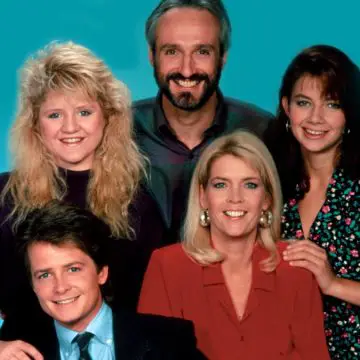
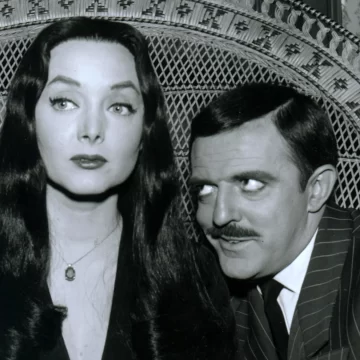

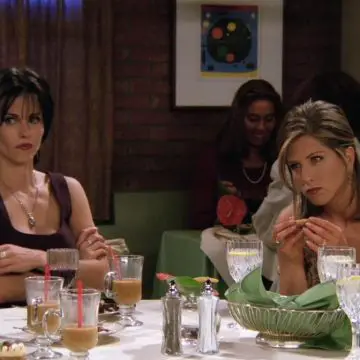
Leave a Reply